Part of the responsibility I feel in writing my blog and keeping my Facebook page includes bringing awareness to problems and concerns that all chicken-keepers face. We have a lot of fun with stories and pictures of the pleasant side of keeping chickens, but important topics that make us uncomfortable must be addressed as well. My hope in sharing my experiences is that they will provoke constructive dialogue and thought about how we handle these issues individually. How we care for and keep our chickens and property safe is important to discuss, but in the end, our choices are personal and not subject to others’ approval.
With all the joys and benefits that come with keeping backyard chickens, there are plenty of heartbreaks and weighty decisions to be made about their care, chief among them, whether or not to permit a flock to free-range. This is a sensitive subject and for good reason- the stakes are high and the emotions it evokes, even higher.
In a predator-free world, who wouldn’t prefer allowing their chickens to roam freely, unconstrained by galvanized mesh barriers to explore fresh, clean land and manage their own diets by foraging on insects and vegetation, all while getting plenty of exercise? But, we do not live in a predator-free world and choices must be made based upon our risk tolerances and what we feel is right.
THE MYTH OF SUPERVISED FREE RANGE
The theory of “supervised free-range” suggests that one can prevent predators attack from happening by being physically present with the flock while they graze, unconfined. The concept of supervised free-range seems like a reasonable compromise between the two extremes of complete physical freedom and constant confinement to a limited area. Unfortunately, supervised free-range does not actually prevent predator losses as I witnessed just prior to dusk last night. A coyote silently and skillfully procured his dinner from my flock as I stood mere yards away. My rooster, Blaze, immediately rushed to aid his hen, but the perpetrator and his victim were long gone by the time he reached the crime scene.
While I wish it were true that chickens are safe when we are nearby, it simply is not. Free-ranging chickens, supervised and unsupervised are fair game in the food chain. A predator’s hunger can take precedence over any fear of humans, and the speed with which they procure their meal, quicker than the eye. While I was armed with only a camera last night, even if I had been holding a loaded firearm, I could not have prevented or stopped the coyote attack from occurring.
The attack itself, which occurred right behind me, is not depicted in this video, what the video shows is what was going on in front of me as it happened. By the time I turned around, the coyote was a vanishing blur and all that remained of my hen was a pile of feathers (also not shown).
There is no question that unconstrained ranging on pasture is a more natural experience for chickens or that they are healthier as a result of being able to choose from Nature’s buffet of greens and protein sources while getting much-needed exercise. The only question that remains is, what is the best quality of life I can afford my chickens given my risk tolerance for predators?
Personally, I prefer to allow my chickens live their lives fully and freely, unconfined during the day and if Nature claims them back into the food chain, I grudgingly accept that fate.
The messages I hope to impart by sharing this experience are that:
- the benefits and risks of free-ranging should be thoughtfully weighed;
- one’s personal risk tolerance for loss should be carefully considered;
- what one flock-keeper is comfortable with is the right choice for them- others need not approve.
I am always mindful that we built our house in Nature’s backyard, not the other way around and I accept the rules of the game that were in place before we imposed upon it.
Kathy Shea Mormino
Affectionately known internationally as The Chicken Chick®, Kathy Shea Mormino shares a fun-loving, informative style to raising backyard chickens. …Read on


shop my SPONSORS
Part of the responsibility I feel in writing my blog and keeping my Facebook page includes bringing awareness to problems and concerns that all chicken-keepers face. We have a lot of fun with stories and pictures of the pleasant side of keeping chickens, but important topics that make us uncomfortable must be addressed as well. My hope in sharing my experiences is that they will provoke constructive dialogue and thought about how we handle these issues individually. How we care for and keep our chickens and property safe is important to discuss, but in the end, our choices are personal and not subject to others’ approval.
With all the joys and benefits that come with keeping backyard chickens, there are plenty of heartbreaks and weighty decisions to be made about their care, chief among them, whether or not to permit a flock to free-range. This is a sensitive subject and for good reason- the stakes are high and the emotions it evokes, even higher.
In a predator-free world, who wouldn’t prefer allowing their chickens to roam freely, unconstrained by galvanized mesh barriers to explore fresh, clean land and manage their own diets by foraging on insects and vegetation, all while getting plenty of exercise? But, we do not live in a predator-free world and choices must be made based upon our risk tolerances and what we feel is right.
THE MYTH OF SUPERVISED FREE RANGE
The theory of “supervised free-range” suggests that one can prevent predators attack from happening by being physically present with the flock while they graze, unconfined. The concept of supervised free-range seems like a reasonable compromise between the two extremes of complete physical freedom and constant confinement to a limited area. Unfortunately, supervised free-range does not actually prevent predator losses as I witnessed just prior to dusk last night. A coyote silently and skillfully procured his dinner from my flock as I stood mere yards away. My rooster, Blaze, immediately rushed to aid his hen, but the perpetrator and his victim were long gone by the time he reached the crime scene.
While I wish it were true that chickens are safe when we are nearby, it simply is not. Free-ranging chickens, supervised and unsupervised are fair game in the food chain. A predator’s hunger can take precedence over any fear of humans, and the speed with which they procure their meal, quicker than the eye. While I was armed with only a camera last night, even if I had been holding a loaded firearm, I could not have prevented or stopped the coyote attack from occurring.
The attack itself, which occurred right behind me, is not depicted in this video, what the video shows is what was going on in front of me as it happened. By the time I turned around, the coyote was a vanishing blur and all that remained of my hen was a pile of feathers (also not shown).
There is no question that unconstrained ranging on pasture is a more natural experience for chickens or that they are healthier as a result of being able to choose from Nature’s buffet of greens and protein sources while getting much-needed exercise. The only question that remains is, what is the best quality of life I can afford my chickens given my risk tolerance for predators?
Personally, I prefer to allow my chickens live their lives fully and freely, unconfined during the day and if Nature claims them back into the food chain, I grudgingly accept that fate.
The messages I hope to impart by sharing this experience are that:
- the benefits and risks of free-ranging should be thoughtfully weighed;
- one’s personal risk tolerance for loss should be carefully considered;
- what one flock-keeper is comfortable with is the right choice for them- others need not approve.
I am always mindful that we built our house in Nature’s backyard, not the other way around and I accept the rules of the game that were in place before we imposed upon it.




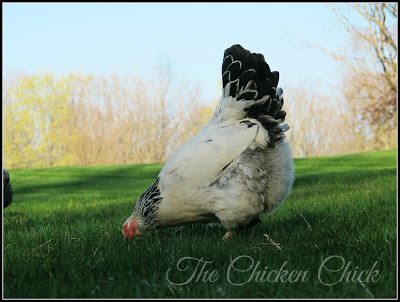
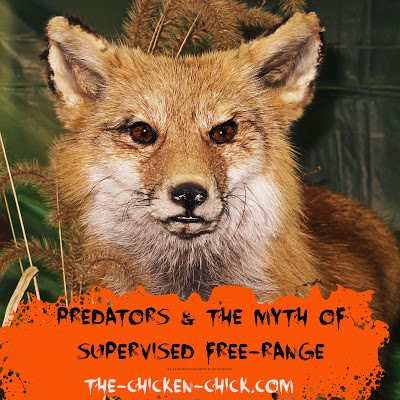
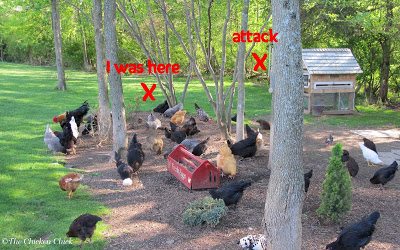
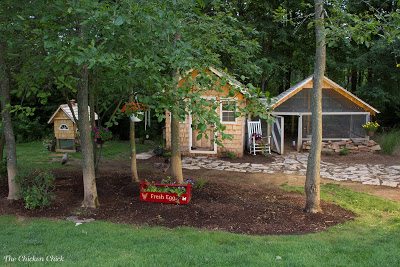
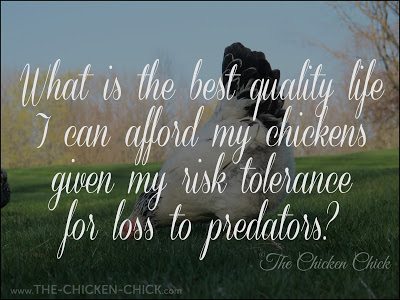
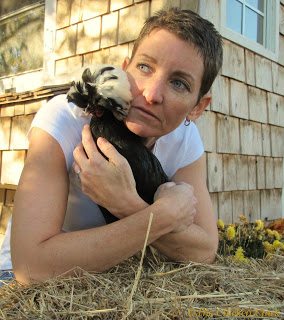






















I just found one chicken dead in pen with feathers all over the ground. the head was mauled. 2 of my other chickens were missing tail feathers and one had a bald spot on rear back. We live in a neighborhood and have a 6foot fence. It is dark so I can’t see much around the fence line right now. I am thinking a dog got into my yard somehow but not sure. my sex link was hiding in a pile of brush. My other two were freaked out. Does it sound like a dog or what? I live in… Read more »
I’m bummed. One of my chickens was taken this evening. My question is: how do I get my two buff Orpingtons to go down to the run? We built a small coop that sits on top of the run. We have a hole and ramp built but they have never gone down it and prefer to stay in the coop until I let them out to free range. I don’t think that’s an option anymore. :( I’d like to make it through the winter with my last two chickens!
I’m sorry for your loss, Renee. Hawks are difficult to defend against. You can try stringing fishing line in a grid pattern over the area they range in- it prevents the hawks from being able to land, but does not stop them from simply walking into the area where the chickens are.
My chicken was atacked and killed by a hawk today. My girls free roam during the day and around 4:00 I saw a hawk in a tree and my sweet chicken lifeless underneath. My husband doesn’t want the chickens to free roam and has warned me of this happening. I’m confused and heartbroken. My girls are only 15 weeks old and my plan was never to confine my chickens 24/7. How long should I keep the rest of my chickens in the run to recover? Losing a pet is never easy.
LOL that was one funny story! Except of course about the loss of your chickens. I always wanted a Polish too.